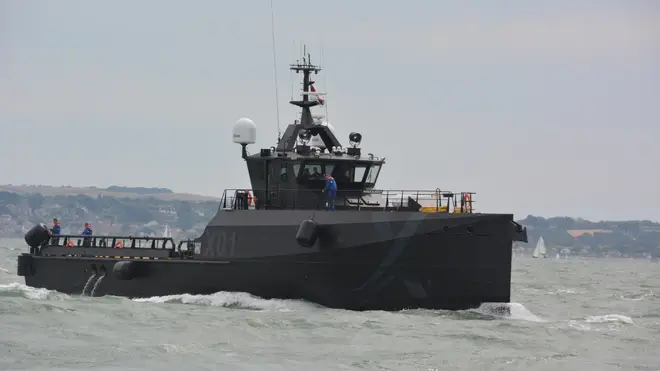
Richard Spurr 1am - 4am
29 July 2022, 10:04

The XV (Experimental Vessel) Patrick Blackett arrived at Portsmouth Naval Base earlier this week.
An experimental warship has been unveiled by the Royal Navy to be used to test state-of-the-art technology, including autonomous systems.
The XV (Experimental Vessel) Patrick Blackett arrived at Portsmouth Naval Base earlier this week.
The 138ft (42m) vessel has been converted from a Dutch-built Damen 4008 Fast Crew Supply Ship and painted in matt black with the insignia X01 on the side.

The Navy’s innovation experts, NavyX, will use the 270-tonne ship to test new systems without the need to tie up one of the fleet’s smaller warships.
A spokesman said: “It will be used by the Navy’s experimentation and innovation experts, NavyX, who have been driving innovation across the service and testing new technology, kit and concepts, passing them quickly to the front line.
“The ship, with a crew of five Royal Navy personnel, will have a ‘plug and play’ element to support the Navy’s new Pods (Persistently Operationally Deployed Systems) concept, which means it can be adapted to the specific trials or experiments it’s carrying out, including testing drones and autonomous vessels and AI decision-making.
“It will also have container secure points on the work deck so a range of payloads can be embarked, offering flexibility and a modern approach to testing.”
NavyX plans for the XV Patrick Blackett to take part in Royal Navy and Nato exercises, with the possibility of it being upgraded to run autonomous technology.

Colonel Tom Ryall, head of NavyX, said: “The arrival of this vessel is a pivotal moment for NavyX’s ability to deliver output for the Royal Navy.
“She will give us greater flexibility to experiment with novel military capabilities, and accelerate new technology, kit and concepts to the front line.”
The ship is named after former sailor and physicist Patrick Blackett, who won the Nobel Prize for physics in 1948.
He served in the Royal Navy in the First World War and made a major contribution in the Second World War, advising on military strategy, and became the admiralty’s first director of operational research.